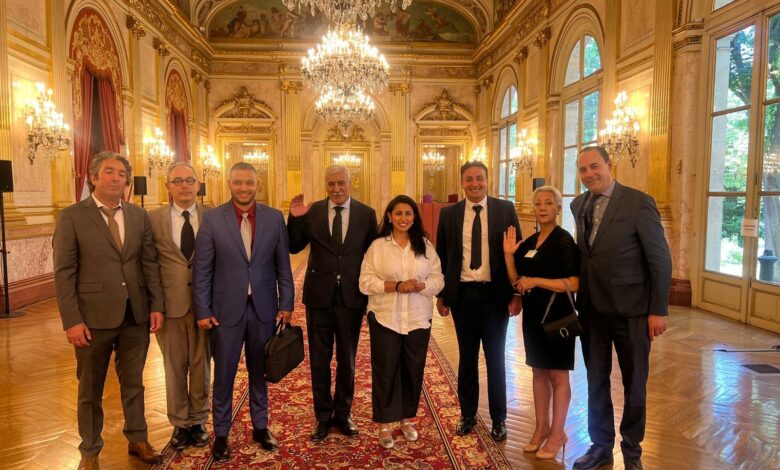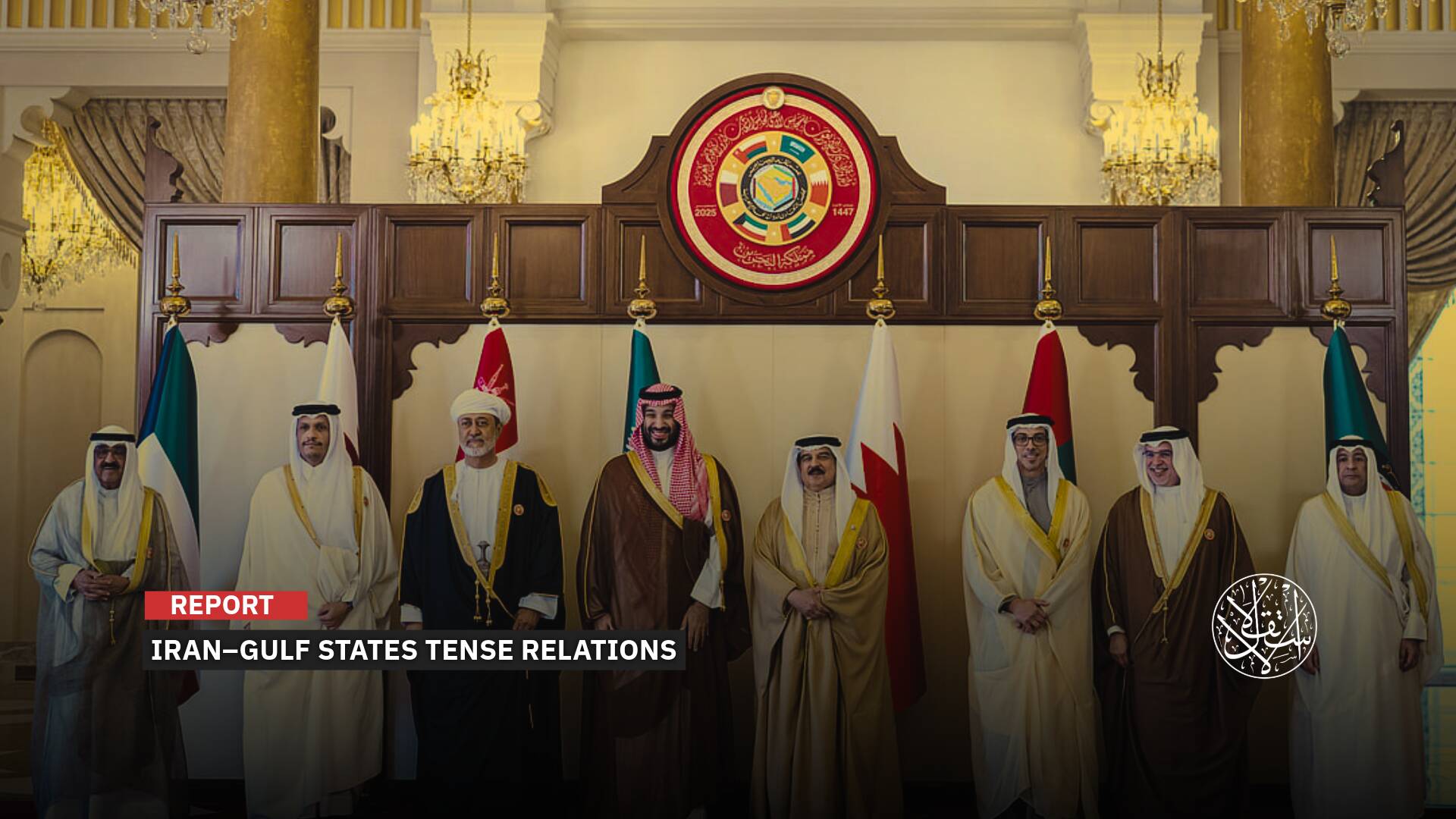French Parliament Hosts Kabyle Separatist Government: What’s Behind the Move?

Algeria’s political landscape is evolving as the government explores a political resolution.
Amid an ongoing political and diplomatic crisis between Algeria and France, a delegation from the self-proclaimed Kabyle government demanding independence from Algeria was received inside the French Parliament — a move that invites scrutiny over its background and implications.
French MP Hanane Mansouri, a member of the Union of the Right for the Republic, hosted the delegation of the “Kabyle government-in-exile” led by its president, Ferhat Mehenni, at the National Assembly in Paris on June 18, 2025.
According to Al-Dar, the symbolic reception on June 18, 2025, “reflects the growing interest in the Kabyle cause and represents a new step toward political recognition of the Kabyle issue on the international stage.”
“Discussions centered on the state of civil liberties in Algeria, the rights of the Kabyle people, and prospects for cooperation between members of the government-in-exile and French lawmakers attuned to the struggles of oppressed peoples,” as reported by Al-Dar.
Political Backgrounds
In this context, Ferhat Mehenni praised MP Mansouri’s courage and clarity, describing her gesture as one of “strength and a commitment to democratic values and the right of peoples to self-determination.”
Speaking to the press, Mehenni said the meeting reflects a growing awareness within certain European political circles of the political and cultural marginalization endured by the Kabyle region — under what he did not hesitate to call an authoritarian Algerian regime.
The Kabyle delegation reaffirmed that its demand for self-determination is “rooted in a peaceful commitment, far removed from all forms of violence and disorder, and framed within a clear political project that embodies the legitimate aspirations of the region’s inhabitants for freedom and dignity.”
This development forms part of a broader series of initiatives undertaken by the Kabyle government-in-exile to expand its political and diplomatic support on the international stage.
This move comes after France announced it would host the president of the Kabyle government-in-exile, Ferhat Mehenni, during the 36th edition of the Paris Book Festival 2025, set to take place in the Brittany region (northwest France) on October 25–26, 2025.
According to a statement from the festival organizers, the event, to be held in the town of Carhaix, will be dedicated to the Kabyle region and will welcome Mehenni as “a writer, poet, and peaceful activist,” as well as in his capacity as president of the Movement for the Self-Determination of Kabylia (MAK) and the Kabyle provisional government in Paris.
The move also comes against the backdrop of a diplomatic rift between Algeria and France, which has deepened since Paris declared its support, in late July 2024, for Morocco’s autonomy plan for Western Sahara.
Algeria, in contrast, backs the Polisario Front, which rejects the autonomy proposal and calls for a referendum on self-determination for the people of the territory.
President Abdelmadjid Tebboune has not visited France since taking office in 2019.
His first official trip to Paris was initially scheduled for early May 2023, then postponed to June, before being delayed once again to autumn 2024.
On April 15, 2025, Paris announced it had recalled its ambassador, Stéphane Romatet, for consultations.
Since then, the French embassy in Algiers has remained under the leadership of a temporary envoy, following Algeria’s decision to expel 15 staff members from French diplomatic services — a move to which Paris responded by expelling 12 members of the Algerian consular and diplomatic staff in France.
At the end of May 2025, the French presidency announced that President Emmanuel Macron had called for a resumption of dialogue between the two countries, stating that “it is in the interest of both France and Algeria to resume discussions.”

‘MAK’ Movement
The Movement for the Independence of Kabylia, known by its French acronym MAK, seeks the independence or separation of the Kabyle region in northeastern Algeria, which comprises six provinces: Tizi Ouzou, Bejaia, Boumerdes, Bouira, Setif, and Bordj Bou Arreridj.
MAK was founded in 2001 by Ferhat Mehenni in the wake of the 34th anniversary of what is referred to as the “Amazigh Spring” — a period marked by widespread unrest and violence in the Kabyle region that left around 126 people dead, 5,000 injured, and 200 permanently disabled.
Mehenni studied political science at the University of Algiers and was arrested more than a dozen times for his political and social activism.
He took part in numerous protests and strikes throughout the 1990s demanding Amazigh rights, establishing himself as a prominent figure in the Amazigh cultural movement.
Mehenni was also a founding member of the Algerian League for Human Rights in 1985, as well as the Rally for Culture and Democracy party.
The MAK movement is headquartered in Paris and has long been denied official recognition by successive Algerian governments.
In May 2021, President Tebboune’s administration went further, designating the group as a terrorist organization.
Under this classification, Algeria sought the extradition of Aksel Bellabbaci, a prominent MAK official and opposition figure.
However, on May 14, 2025, the Paris Court of Appeal rejected the request, citing concerns over the charges, which Algiers had framed as acts of terrorism.
Aksel Bellabbaci’s lawyer, Gilles William Goldnadel, described the ruling as “very reassuring” and “a happy day for French justice.” He added, “I would even say it is a sad day for Algerian justice, though there is no justice in Algeria as long as the dictatorial regime continues to repress its citizens, especially the Kabyle people.”
Bellabbaci, 42, faces 14 charges brought by the Algerian judiciary, some of which carry the death penalty.
Although the death penalty remains codified in Algerian law, it has not been carried out since a moratorium was put in place in 1993.
Outside the courtroom, the exiled opposition leader declared, “The struggle continues because we will not stop here,” emphasising that “the Kabyle people are innocent” of the charges leveled by the Algerian regime.

The Senate
The National Assembly’s move follows another surprise development in the strained relations between France and Algeria, when the French Senate hosted a delegation from the Kabyle government-in-exile and the MAK movement in April 2025 — underscoring how the Kabyle issue has entered the French political arena.
According to L’Observateur, on April 1, 2025, this reception came shortly after a phone call between Presidents Macron and Tebboune aimed at finding a solution to the ongoing crisis between the two countries.
The same source reported that the Anavad movement and its leader, Ferhat Mehenni, received a warm welcome from members of the French Senate who support their cause and “fight for the independence of the Kabyle region,” as they described it.
The delegation briefed senators on the situation in Kabylia, marked by severe repression of citizens who are “victims of the Algerian dictatorship,” according to Mehenni, who insisted that “the cry for help from Kabylia must be heard.”
The report noted that the French Senate’s decision to open its doors to the Kabyle government and movement “signals progress in the cause.”
It also noted that several international bodies, including the United States and Canada, have received representatives of the Kabyle movement, who are preparing their case for the United Nations Committee on Decolonization.
Measuring Tool
Khalid Chiat, a professor of international relations at Mohammed First University in Oujda, Morocco, views France’s use of the Kabyle issue—whether by the Senate or the National Assembly—as a political manoeuvre rather than a principled stance.
Speaking to Al-Estiklal, Chiat said some factions in France are investing in the matter based on what he called a “principled basis, if one can say so,” relating to the right to self-determination for peoples formerly under colonial rule.
“A divided Algeria could serve the interests of certain countries, which means there may now be a practical and active effort to bring this about. France’s handling of the Kabyle issue amid the ongoing crisis with Algeria could therefore serve as a barometer for measuring how seriously this matter is being approached.”
“This issue contains all the necessary elements for separatism, meaning that France’s involvement will have both a transitional dimension and a deeply geopolitical one in shaping this separatist framework within Algeria.”
“Morocco does not favour this outcome and does not want Algeria to fragment or split. Rabat desires a unified and stable eastern neighbour, within a political framework of regional integration and solidarity, rather than a state weakened or heading towards separation,” Chiat added.
However, Chiayat cautioned that “the path to maintaining Algeria’s unity may prove difficult, given the nature of the political regime’s choices—particularly on the geopolitical front and in terms of major policy decisions—which are flawed and could lead to a phase of division or fragmentation.”
It is worth noting that Morocco refused permission for a preparatory meeting of an association called the “Moroccan Support Committee for the Recognition of the Kabyle State” in May 2024, in the city of Agadir (southwest).
Saaid Amzazi, the governor of the Souss-Massa region, explained the refusal by stating that the meeting contradicts the fundamental principles of the Kingdom of Morocco, which does not support the secession of states.
Earlier, prominent lawyers in the United Kingdom issued a legal opinion in September 2024 affirming the eligibility of over 10 million Kabyle people—whether living within Algeria’s current borders or exiled abroad—to be recognized as a “people” under international law.
The legal opinion was issued by Robert McCorkindale of the law firm Brick Court Chambers and Penelope Nevill of Essex Court Chambers in the UK.
Their analysis concludes that “the inhabitants of the Kabyle region constitute a people under international law and therefore possess the human right to self-determination under international law.”
This represents the first independent legal recognition of the Kabyle people as a distinct group entitled to the right of self-determination under international law.
Negative Reaction
In response to the growing international support for the Kabyle cause, Algerian authorities have initiated a series of indirect but sustained contacts with Ferhat Mehenni.
According to Sahel Intelligence, based in Paris, on April 19, 2025, the aim of these exchanges is to establish the foundations for autonomy in the Kabyle region, within the framework of Algerian state sovereignty.
The outlet cited sources close to the Ministry of Defence and President Tebboune, revealing that unofficial intermediaries have been tasked in recent months with communicating with Mehenni in an effort to resolve the Kabyle issue peacefully.
Despite the movement being officially designated as a terrorist organization by Algerian authorities, sources suggest that “the landscape is shifting in Algeria, with the government seeking a political solution — one that includes Ferhat Mehenni.”
According to these same sources, discussions are centered on establishing a clear institutional framework for the Kabylie region, including a regional parliament, autonomous governance, the official use of the Amazigh language as a primary language, and local management of economic affairs — particularly in sectors such as forestry, artisanal industries, and tourism.
Mehenni himself has set forth several conditions for any serious negotiations, including lifting the ban on the Amazigh Liberation Movement, releasing Kabyle political prisoners, official recognition of the pluralistic Amazigh identity, and most crucially, the presence of a neutral international mediator to oversee the process.
These developments come amid growing political fragility in Algiers. The central government, grappling with economic, social, and diplomatic challenges, is keen to ease internal tensions.
Sahil Intelligence emphasized that voices within the state have now recognized the dead-end of a purely security-focused strategy towards Kabyle demands, and that dialogue is preferable to avoidance.
Reactions to the alleged talks remain sharply divided. While some civil society figures have welcomed the attempt to resolve the crisis, certain political and military elites view any recognition of the MAK movement or its leader in a highly negative light.
As a result, Ferhat Mehenni — long sidelined — may be re-emerging at the center of national debate, with the independence of the Kabylie region, once a taboo subject, now becoming a key focal point in Algeria’s political landscape.
Sources
- Another slap for the Algerian regime: Official reception of the Kabyle Government in exile at the French Parliament [French]
- The Kabyle Government in exile received at the French Senate [French]
- British legal opinion affirms the Kabyle movement’s right to a self-determination referendum in Algeria [Arabic]
- French justice refuses the extradition of Aksel Bellabbaci, a Kabyle opposition figure wanted by Algeria [French]
- Kabylie: Algeria in discreet talks with Ferhat Mehenni over autonomy for Kabylie under national sovereignty [French]











